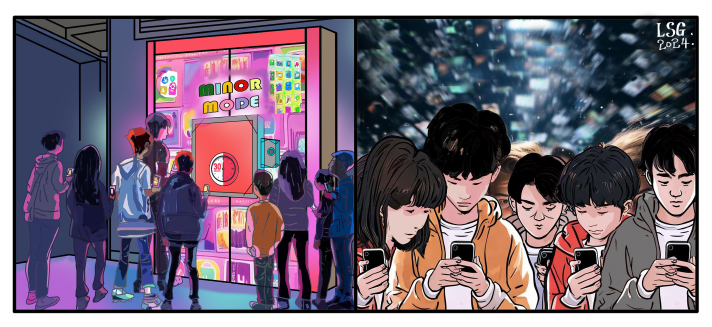
(CARTOON BY LI SHIGONG)
As concerns over cyberbullying and mental health rise, the global debate over minors using social media intensifies.
A high school in Hangzhou, Zhejiang Province, recently issued a letter to its students recommending they avoid social media and refrain from creating accounts until they are at least 16 years old.
Around the same time, a newly passed bill in Australia's Senate on November 29 drew worldwide attention. The amendment to the country's Online Safety Act will prohibit children under 16 from using social media starting next year, even if they have parental consent.
These developments have reignited debate over the extent to which minors should have access to social media. Critics point to the potential risks of social media usage among children as justification for restrictive measures. Conversely, others argue that a one-size-fits-all approach is inappropriate, noting the potential for social media to have positive effects on minors' growth and development.
For both Chinese schools and Australian law, is there a right approach to curbing young people's online presence?
Wan Lijun (Hunan Daily): Social media is saturated with diverse information and content, some of which can be misleading—even for adults. For minors, who often lack the critical skills to distinguish between beneficial and harmful material, the risks are even greater. Beginning in 2019, the Cyberspace Administration of China instructed social media platforms to introduce a "minor mode."
This year, the Regulations on the Protection of Minors in Cyberspace took effect. It has become a widely held belief that minors should maintain a certain distance from social media—and the Internet in general.
Australia's newly passed legislation bans anyone under the age of 16 from using social media. However, its feasibility has raised concerns due to the lack of detailed implementation strategies. Given how pervasive social media has become, it seems impractical to completely prohibit its use by children or expect them to not go on these platforms at all.
But social media is not inherently harmful. The key is how to make good use of it. It can provide children with useful information, facilitate social interactions and offer entertainment and relaxation. Instead of imposing outright bans, a more constructive approach would involve guiding minors on how to use social media reasonably and responsibly. For example, the above-mentioned school in Hangzhou has encouraged students and their parents to create device-free periods during the day, replacing screen time with enriching cultural activities or physical exercise.
How the Australian ban and the proposals from Hangzhou's school will play out remains to be seen.
Chu Zhaohui (Huanqiu.com): To regulate children's use of social media, a combination of strict laws and adaptable measures suited to real-world situations is necessary. Recently, China issued guidelines for developing a minor mode for the mobile Internet, targeting smart devices, applications and content distribution platforms.
These guidelines address issues such as usage time limits, duration, and content restrictions. Internet companies are required to comply with the Regulations on the Protection of Minors in Cyberspace. Tailored restrictions on social media usage for different age groups are introduced.
According to the guidelines, children's rights to use social media evolve as they mature, with their parents and teachers bearing responsibility for supervising their usage. Minors with strong self-discipline can leverage the minor mode to support their personal growth, while those with weaker self-control require closer parental guidance to navigate these tools responsibly.


